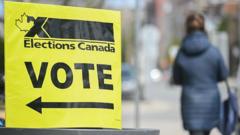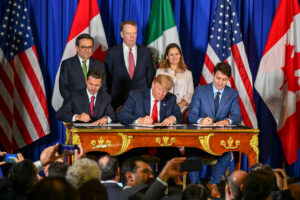With early voting numbers at 7.3 million, the upcoming election could see significant shifts in political power amid ongoing U.S. trade tensions.
Record-Breaking Early Voting in Canada: Over 7 Million Ballots Cast

Record-Breaking Early Voting in Canada: Over 7 Million Ballots Cast
Canada sees unprecedented early voter participation ahead of the April 28 election, raising anticipation and tension among federal party leaders.
Minister of Elections, Canada - More than 7 million Canadians have flocked to the polls in record numbers for early voting, as reported by Elections Canada. This surge in participation, which saw 7.3 million ballots cast, accounts for around a quarter of eligible voters and marks a significant 25% increase compared to early voting in the 2021 elections.
Advance polling took place over the Easter weekend, and long lines at polling stations reflected the heightened interest. Notably, on the first day alone—last Friday—two million individuals participated in casting their votes. With less than one week remaining until the official election day on April 28, federal party leaders brace for final campaigning efforts as tensions rise due to a protracted trade dispute with the United States and ongoing criticisms from President Trump about Canada potentially becoming the 51st state.
Elections Canada indicated a rise in mail-in voting as well, with more than 754,000 Canadians returning their special ballots—a notable increase from the previous elections. As the political landscape evolves, the latest polls suggest that the Liberal party holds a narrow lead of five points over the Conservative opposition, enhancing the competitive atmosphere ahead of polling day.
Liberal leader Mark Carney is actively campaigning in regions like Prince Edward Island and Quebec, presenting his party as the most equipped to deal with the challenges of U.S. tariffs and trade relationships. During a campaign rally, he criticized Conservative leader Pierre Poilievre, claiming he lacks the resolve to confront President Trump effectively.
Conversely, Poilievre has centered his campaign on vowing change after years under the previous administration and addressing pressing issues such as housing and the cost of living, emphasizing responsible government spending.
The Bloc Quebecois currently sits in third place in the polls, advocating for Quebec separatism, while the New Democratic Party lags in fourth. The upcoming election is poised to be a significant turning point for Canada's political landscape as voters weigh their choices.
Advance polling took place over the Easter weekend, and long lines at polling stations reflected the heightened interest. Notably, on the first day alone—last Friday—two million individuals participated in casting their votes. With less than one week remaining until the official election day on April 28, federal party leaders brace for final campaigning efforts as tensions rise due to a protracted trade dispute with the United States and ongoing criticisms from President Trump about Canada potentially becoming the 51st state.
Elections Canada indicated a rise in mail-in voting as well, with more than 754,000 Canadians returning their special ballots—a notable increase from the previous elections. As the political landscape evolves, the latest polls suggest that the Liberal party holds a narrow lead of five points over the Conservative opposition, enhancing the competitive atmosphere ahead of polling day.
Liberal leader Mark Carney is actively campaigning in regions like Prince Edward Island and Quebec, presenting his party as the most equipped to deal with the challenges of U.S. tariffs and trade relationships. During a campaign rally, he criticized Conservative leader Pierre Poilievre, claiming he lacks the resolve to confront President Trump effectively.
Conversely, Poilievre has centered his campaign on vowing change after years under the previous administration and addressing pressing issues such as housing and the cost of living, emphasizing responsible government spending.
The Bloc Quebecois currently sits in third place in the polls, advocating for Quebec separatism, while the New Democratic Party lags in fourth. The upcoming election is poised to be a significant turning point for Canada's political landscape as voters weigh their choices.





















